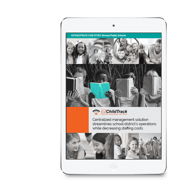
The key to a good relationship is good communication and the most important relationship you will have in your childcare center, outside of the one you have with the children, is the one you have with their parents.
You spend an enormous amount of time with someone’s child and have the opportunity to observe behavior the parents may not have noticed. You provide activities to help the child develop. You are in the position of being the parent’s eyes, ears, and heart for the child on a daily basis.
Because they cannot be there, parents yearn to know what their child is doing every day. You may observe something of concern you want to point out to the parents. You have notices about events, registration, and billing to send to every parent. There is no time during drop-off and pick-up to talk about everything.
How can you communicate each of these different pieces of information clearly and appropriately?
Understand the Impact of Language and Emotion
Clear communication requires preparation. Before you speak or write, think about how you frame your information. Language is nuanced, and each receiver interprets the information in a slightly different way.
Straight forward communication about registration dates and billing invoices is simple. You type the dates and amounts into a form to distribute to each parent. Letting each parent know what their child does each day can be done through daily or weekly journals listing the activity and any other daily information a parent may need to know about their child on an age appropriate basis.
The previous types of communication are easy, but when there is a problem, such as a child repeatedly misbehaving, not keeping up with peers, or showing physical or mental behavior outside the norm, speaking to the parents can take a little more preparation.
Take stock of how you feel before you speak. If you are angry or tense, it will come across in your language and tone of voice as well as your body language. Calm yourself and carefully choose your words as you convey any concern to a parent because what you say and how you say it will have a direct impact on your ability to partner with the parent to resolve the issue in the best interests of the child.
Ask Parents for Communication Preferences
Back in the day you could send written notes home with the child, post information on the door to the facility, or call a parent on the phone for the most serious issues. Parents and providers understood there were limits to communication and did not expect to be in touch every moment of the day.
Now, you have email, online communities, cell phones, and text messaging. Parents have the expectation that you will communicate in real-time and that the information they need will be conveniently available any time they need it.
Each parent will have a preferred method of communication for different types of information. When a child is registered in your childcare facility, ask the parent or guardian for the preferred method of receiving different types of information. Make the choices part of the registration process and encourage people to update their preferences as needed.
Some parents expect to see everything in a centralized, online portal where they can read about what their child did each day, download or fill out forms, change communication preferences, and do most of their business with you online. For serious matters, they want to be notified immediately by phone or text message. They want access to an online calendar to make appointments to see you. They expect to be able to register and pay online.
Others will want or need a printed form or note. You may be limited to specific times to call on the phone.
Make a note of each preference on the child’s record, have parent’s check that you have the right contact information, and train the staff to follow the preferences.
Use Care in Communicating Serious Concerns
If you have a serious concern to communicate with a parent, a prearranged, face-to-face meeting is always the best method. If that is not possible, a phone call will have to do, but you must speak to the parent or guardian personally. This is not the type of communication to place in an email or a message.
Use the parent's preferred contact method to let them know you need to speak with them about something important and you need a certain amount of their time. Make the appointment as soon as possible, so you meet with the parents and speak with them privately and without disruption.
Remain calm when you describe your observations and avoid jargon or technical language. Remember that it is not up to you to offer a diagnosis; simply pass along what you observed and urge the parents to follow up with the appropriate expert.
Be prepared with resources to pass along that can help parents find assistance. Be prepared, also, for strong emotions and do your best to remain calm and supportive at this trying moment. Keep your eye on the goal of getting help for the child in the form of a professional assessment as soon as possible.
Find the Best Format for the Information You Are Providing
As with communication methods, the way the information is presented impacts comprehension.
Written
- Bulletin board with daily activities for each age group
- Weekly reports
- Handouts and fact sheets with lessons for home or about the program
- Daily logs about the child’s day and any changes in parental schedules
Online
- Weekly or monthly newsletter for each age group
- Emails to parents at home or work
- Parent portal for registration and to post photos
- Online community for parents to communicate with the school and each other
- Website
For ESL Families
- Hire and communicate bilingually when possible
- Encourage teachers to learn key words and phrases in the child’s home language
- Provide plenty of photos and videos

Remain Open and Welcoming
Keep the lines of communication open by providing a welcoming environment within the facility. An open seating space where providers and parents can sit chat allows you to build relationships between staff and clients. Let everyone know about the various methods of communication that are available and encourage them to keep contact information up to date.
When passing along observations and concerns always use “I” statements and avoid sounding accusatory or negative. Find something positive to say about the child before talking about anything negative. Let the parents know you are there as a resource and to support them and their child.
A childcare management solution can streamline many forms of communication.
- Parent portals provide a central area for communications about billing, medical records, forms, and other information for individual families.
- You can send group or individual emails through the solution to keep all data and communication records in one place.
- Accounting applications integrate with communications for billing and payment processing.
- An online calendar helps schedule meetings and activities.
Communication between parents and childcare provider is crucial to a child’s development and welfare. Become familiar with the various options to keep the lines open.



